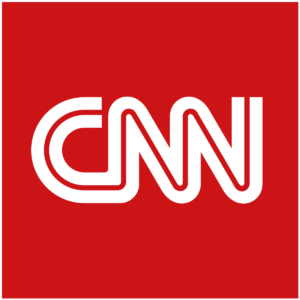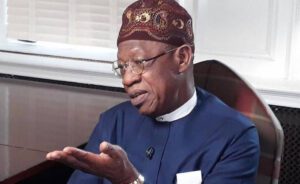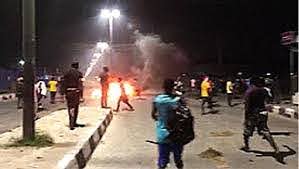By Azuka Onwuka
Jokes are meant to make people laugh. But when they fail to make people laugh, they become embarrassing. That was how the recent reaction of Mr Lai Mohammed, Nigeria’s Minister of Information, to the investigative report of the CNN over the Lekki tollgate shooting appeared. It started like a bad joke from an unserious comedian before a large audience. By the time it ended, the audience became embarrassed on behalf of the comedian for churning out such a tasteless, colourless, thoughtless joke before a global audience.

Mohammed threatened to sanction the CNN because of the report, which showed that the Nigerian military fired live bullets directly at protesters. How did Mohammed plan to sanction a privately owned American cable TV network from Nigeria? Did he plan to suspend the licence of the international cable network? Did he intend to bar the CNN from broadcasting to Nigeria? Did he intend to stop patronising the CNN by withdrawing all government commercials run on its network? Did he intend to declare the CNN’s staff persona non grata in Nigeria or bar them from all government events? Did Mohammed think that the CNN is a Nigerian media house that is under the control of Nigeria and can be threatened and harassed when it releases independent reports? Was Mohammed not ashamed that he released such a written reaction?

Since the night of October 20, 2020 when soldiers went to the venue of the peaceful #EndSARS protest at the Lekki toll plaza in Lagos and opened fire at the protesters, the stand of the military and government has been changing. The first statement from the Nigerian Army after the shooting incident was that its soldiers never went to Lekki and never shot at protesters. Later, the military acknowledged that its men were at the Lekki toll plaza that night on the request of the Governor of Lagos State, Mr Babajide Sanwa-Olu, but fired only blank cartridges into the air to disperse the protesters.
Sanwa-Olu had earlier lamented that “forces beyond our direct control” caused the tragedy at the Lekki toll plaza, noting that about 25 people were injured and receiving treatment, two of them in the intensive unit. Later, he acknowledged that two people had died as a result of the shooting. The military and the government spokespersons maintained that nobody was killed at the shooting.
While the Lekki shooting was on, one of the protesters, DJ Switch (whose real name is Obianuju Catherine Udeh), had gone live on her Instagram account. Her broadcast showed the shooting going on and some people who had been hit by bullets even being operated upon using knives to remove the bullets from their body. Her live broadcast gave authenticity to the claim that peaceful protesters were shot at by soldiers. She maintained her stand that over a dozen people were killed that night and that the soldiers took away the corpses and even prevented ambulances from coming into the venue to attend to those who were injured. This lady was demonised, harassed and threatened by the government and its supporters until she fled Nigeria and sought asylum in Canada. Their anger was that her broadcast painted the regime in bad light as a killer of its citizens. They wanted the narrative to be that soldiers only fired blank cartridges into the air to disperse the protesters and that nobody was killed.

As a communication professional and the minister in charge of information, Mohammed did not bother to refute the report of the CNN by showing evidence that it was false. He only threatened the CNN with a sanction. Somewhere in the mind of Mohammed, he assumed that CNN was under his purview to bully and intimidate. If President Donald Trump of the United States of America could not silence the CNN, how could Mohammed working for President Muhammadu Buhari of Nigeria achieve that?
In democracies where individuals are not above the law, the media does not exist to massage the ego of political leaders and do their bidding. As the fourth estate of the realm, the media exists to beam its searchlight on the leaders and the led, including the media itself. Therefore, if a media organisation or journalist acts in ways that are controversial, other media houses will beam their searchlight on that organisation or individual, to let the public get the details of the matter. This is a sacrosanct role that is guaranteed by the Constitution.
Given their actions when in the opposition, Mohammed and his principal, Buhari, have been the most intolerant democrats who held the offices of minister of information and president respectively. No opposition presidential candidate was more offensive than Buhari. He held the then ruling party and individuals to account on virtually every issue, and he was not conciliatory in his choice of words. When Alhaji Umaru Yar’Adua was flown abroad in late 2009 and could not function as the president for some weeks, Buhari told him pointedly to resign, since he could no longer manage the affairs of Nigeria. He did not allow the fact that Yar’Adua was from the same state (Katsina), the same ethnic grouping (Fulani), and the same religion (Islam) to becloud his position on the matter. Ironically, in 2017, the same Buhari was flown repeatedly to London for treatment and stayed beyond his initial plan. He spent two months away the first time and 104 days the second time. The nation was not told what was wrong with him. There were street protests that he should resume work or resign. Buhari did not resign.
On his part, Mohammed was one of the most vociferous opposition spokespersons Nigeria has ever known. As the spokesperson for the Action Congress of Nigeria and later the All Progressives Congress, he issued regular press statements or held press conferences in which he X-rayed and criticised any action or inaction of the government in power. He was so consistent and persistent that I wrote an article on him in 2009 to praise his efforts as the voice of the opposition.
However, since 2015 when Buhari became the president and Mohammed became his minister of information, they have increasingly shown their distaste and intolerance for the mainstream media and the social media, always thinking of ways to gag them through hate speech bill, social media control bill and the like. As a military dictator in 1984, Buhari promulgated the notorious Decree 4 (Public Officers Protection Against False Publications Decree), which he used to jail journalists and gag the media. As a civilian leader, that trait has not left him. He does not believe that others have the right to free speech. He sees criticism against his regime as an attack on the country.
However, one demoralising point from the CNN’s report on the Lekki shooting was the issue of Nigeria importing weaponry from Serbia. Serbia is a landlocked country with a population of seven million people. It emerged from Yugoslavia in 1992 as Serbia and Montenegro. In 2006, the country split into two: Montenegro (with a population of 600,000 people) became a country, while Serbia became a country. Last week, it was also announced that Nigeria would be importing refined petroleum products from the Republic of Niger, another landlocked country with 24 million people.
Nigeria under Buhari does not feel any shame that it depends on very small and less-endowed countries for virtually everything it needs. Ironically, most of the things Nigeria imports today are things that were produced in the late 1960s while the Nigerian-Biafran War was on. After the war, Nigeria did not nurture those technological feats. The suffocating Nigerian structure has also ensured that no zone or state can achieve any technological milestones today.
Nigeria is failing and failing fast. The intolerance of opposing views is not helping its condition. Buhari should realise that he is now a civilian leader and not a dictator, and that democracy goes hand in hand with freedom of speech. When people or organisations misuse their freedom of speech, there are also democratic ways to punish them.
– Onwuka is a columnist and author